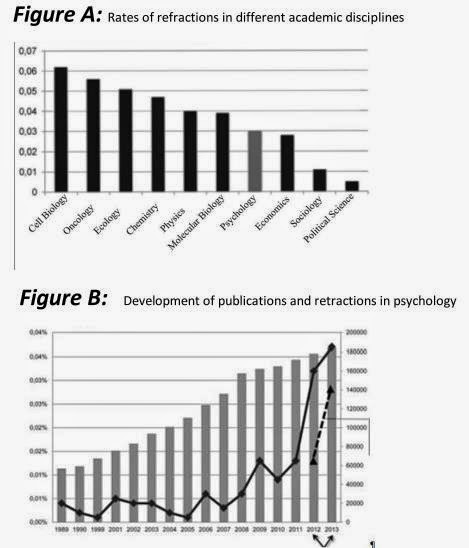
Marc Hauser. Dirk Smeesters. Diederik Stapel.
Psychology has been home to some of the most infamous cases of fraud in recent years, and while it’s just a few bad apples who are spoiling the bunch, the field itself has seen an overall increase in retractions, according to a new paper by Jürgen Margraf appearing in Psychologische Rundschau and titled “Zur Lage der Psychologie.”
That increase, Margraf found, is not entirely due to its most well-known fraudsters. Here’s the relevant figure:
Rolf Degen, who tipped us off to this paper, summarizes the findings available in the figure (and translates some of the study, which is in German):
As figure A makes clear, the field is now located as equal among equals right besides molecular biology (a little more retractions) and economics (slightly less). In other circumstances, psychologists would love to be placed in that neighborhood! And the trend is increasing, as shown by an analysis of all psychological publications and retractions from 1989 through to 2013 (figure B). “We do not only see a sharp increase of publications – up to 190.00 in 2013, about three times more than in 1989 – but also a growth of the rate of retractions, which quadrupled from 0.01 percent to over 0.04 percent,” says Margraf. “Even if the most spectacular case of Diederik Stapel (49 retractions between 2012 and 2013) is deducted, the upswing of retractions, particularly in recent years, is alarming.”
For comparison, the overall rate of retraction over the past few decades is about 0.02%, and grew ten-fold from 2001 to 2010. (And Stapel has 54 retractions, by our count.) The rate of retractions in psychology — 0.03% — seems to be lower than that in stem cell research, but it should be noted that the rates in every field are very low.
An interesting coincidence: Margraf was supposed to work closely with Jens Förster, who was found by the University of Amsterdam to have been “responsible for a case of scientific misconduct.” Förster’s Humboldt professorship — Margraf has one — has been suspended while the foundation investigates.
Like Retraction Watch? Consider supporting our growth. You can also follow us on Twitter, like us on Facebook, add us to your RSS reader, and sign up on our homepage for an email every time there’s a new post.

It is interesting, but I am not sure whether it is an indication of anything (yet). This is an analysis of rare events. Rare events tend to fluctuate and could have very high variability. Notice for example that in psychology, until 2011 the growth retractions was slower than growth in total publications. Essentially the conclusion is based on two data points. Basically, it might be a classic textbook example or a “murder rate” increase. “Compared to the last year the murder rate in our city have increased 3 fold – down with a major! (from 1 killed to…. 3)” . I would wait for couple of years before making any conclusion of this.
Interesting article. One part of this post is not entirely correct though: Jürgen Margraf has in fact been working closely with Jens Förster, as the latter, while waiting for the ultimate decision on his Humboldt professorship, got a “regular” professorship at Margraf’s department. According to another, older post by Rolf Degen, they even have been sharing an office for some time:
https://plus.google.com/101046916407340625977/posts/4zegpZbY4w2
There’s also the Fanellian view to consider i.e. that a healthy level of retraction is good for a field, and is just as much a proxy for scientific vigilance as it is for malpractice.
I cannot quite relate Degen’s interpretation of Figur A to the figure. Of the 10 disciplines listed in that figure, cell biology is on first position and psychology is on position 7, with half the rejection rate of cell biology. That retraction rates are increasing in all areas can have many reasons and is not specific to psycholgy.
Keep a close eye on this case from Japan:
Differential mechanisms underlie the regulation of serotonergic transmission in the dorsal and median raphe nuclei by mirtazapine: a dual probe microdialysis study
Kouji Fukuyama, Shunske Tanahashi, Tatsuya Hamaguchi, Masanori Nakagawa, Takashi Shiroyama, Eishi Motomura, Motohiro Okada, Psychopharmacology (Berl.), 229 (2013)
https://pubpeer.com/publications/F1063251242525B9DCF8F624B2F61E#fb26413
http://link.springer.com/article/10.1007%2Fs00213-013-3122-9
The senior author, Motohiro Okada, has 9 papers being questioned at PubPeer related with neuropsychology and related fields:
https://pubpeer.com/search?q=+Motohiro+Okada
The numbers of under being questioned are increasing now.
https://pubpeer.com/search?q=motohiro+okada&sessionid=B4C47A22195891AC99B2